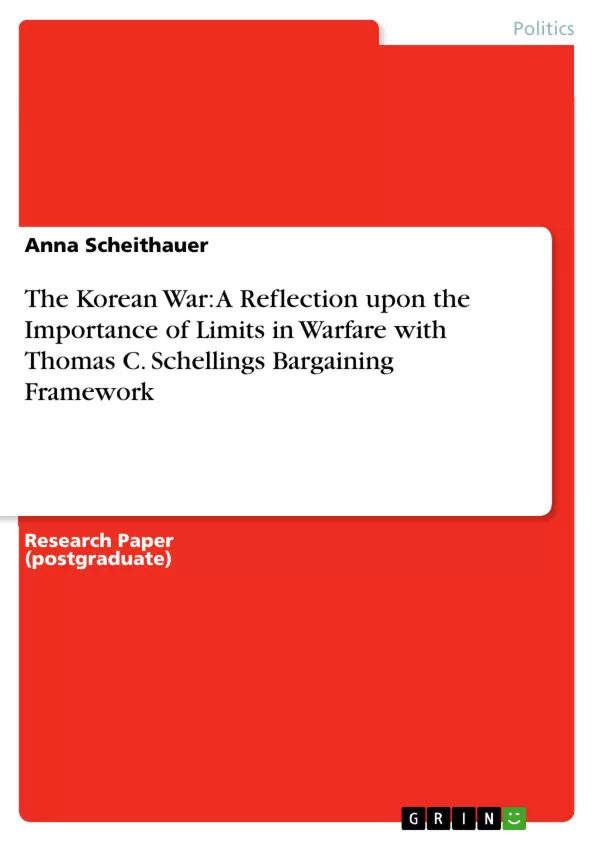This research paper deals with the question of limits in warfare, particularly during the cold war period and the continuing era of nuclear weapons. The importance on their agreement has been emphasized by applying Schelling's concept of focal points within the field of tacit bargaining to the Korean War. Also, the paper discusses the possibility of limited wars as a generator of risk.
Altogether, this paper shall provide a good overview of Schelling's concept of focal points applied to a warfare situation by emphasizing their critical and also controversial role.
Inhaltsverzeichnis (Table of Contents)
- Introduction
- The Role of Limits in Warfare
- Schelling's Bargaining Framework
- The Korean War's Limits
- Limited Wars: A Generator of Risk
- Conclusion
Zielsetzung und Themenschwerpunkte (Objectives and Key Themes)
This research paper explores the concept of limits in warfare, particularly during the Cold War era and the ongoing period of nuclear weapons. It emphasizes the importance of agreements and the role of Schelling's concept of focal points in tacit bargaining. The paper examines the Korean War as a case study, analyzing the establishment of mutually recognized thresholds and the possibility of limited wars as a generator of risk.
- The importance of limits in warfare during the Cold War and nuclear age
- The role of Schelling's concept of focal points in tacit bargaining
- The Korean War as a case study of limited war and the establishment of mutually recognized thresholds
- The potential for limited wars to generate risk
- The controversial and critical role of focal points in warfare
Zusammenfassung der Kapitel (Chapter Summaries)
- Introduction: This section introduces the topic of limits in warfare, highlighting the absence of nuclear war despite the Cold War and emphasizing Schelling's contributions to game theory. It explores the concept of bargaining as a variable-sum game and introduces the central role of limits (focal points) in conflict resolution.
- The Role of Limits in Warfare: This chapter delves into Schelling's framework of bargaining, differentiating between tacit and explicit bargaining. It further examines the concept of tacit coordination and tacit bargaining, focusing on the importance of "range of alternative outcomes" in reaching a mutually acceptable outcome.
- Schelling's Bargaining Framework: This chapter provides a more detailed explanation of Schelling's concept of tacit bargaining, including the role of coordination and convergent points. It illustrates the concept through the example of a couple lost in a department store and the search for a mutually recognizable point of convergence.
- The Korean War's Limits: This chapter applies Schelling's concepts to the Korean War, demonstrating how it serves as a classic example of a limited war with tacit bargaining over outcomes and conduct. It highlights the crucial role of geographical and political boundaries, such as the Yalu River and the 38th parallel, as well as the influence of international agreements like the Geneva Conventions in establishing limits.
Schlüsselwörter (Keywords)
The paper focuses on the following keywords: limits in warfare, Cold War, nuclear weapons, Schelling, focal points, tacit bargaining, Korean War, limited war, risk, brinkmanship, Geneva Conventions.
Frequently Asked Questions
What is Schelling's concept of 'focal points'?
Focal points (or Schelling points) are solutions that people tend to use in the absence of communication because they seem natural, special, or relevant to them.
How was the Korean War a 'limited war'?
Despite the high stakes, both sides observed tacit limits, such as not using nuclear weapons and respecting certain geographical boundaries like the Yalu River.
What is 'tacit bargaining' in warfare?
It is a form of negotiation where parties reach agreements on conduct and limits through actions and signals rather than explicit verbal communication.
Why are limits important in the nuclear age?
Limits prevent total escalation and ensure that conflicts remain manageable, reducing the risk of global nuclear catastrophe through mutually recognized thresholds.
What role did international agreements like the Geneva Conventions play?
They served as established focal points that provided a framework for conduct, even in the absence of direct negotiations between the warring parties.
- Citation du texte
- Anna Scheithauer (Auteur), 2009, The Korean War: A Reflection upon the Importance of Limits in Warfare with Thomas C. Schellings Bargaining Framework, Munich, GRIN Verlag, https://www.grin.com/document/350710



